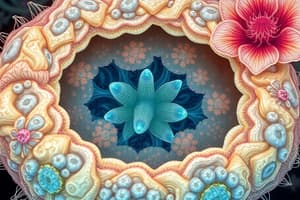Podcast
Questions and Answers
What is primarily responsible for the differences in cell composition between plant and animal cells?
What is primarily responsible for the differences in cell composition between plant and animal cells?
- The size of the nucleus
- The unique cell organelles present (correct)
- The number of cells in an organism
- The presence of ribosomes in all cells
Which organelle is unique to plant cells and is responsible for photosynthesis?
Which organelle is unique to plant cells and is responsible for photosynthesis?
- Nucleus
- Mitochondria
- Chloroplasts (correct)
- Lysosomes
Which statement is true regarding the size of plant and animal cells?
Which statement is true regarding the size of plant and animal cells?
- Animal cells can be 100 micrometres in size
- Animal cells are typically larger than plant cells
- Plant cells range from 10 - 100 micrometres (correct)
- Both cell types are the same size
What role do plants typically play in an ecosystem?
What role do plants typically play in an ecosystem?
What type of cells are collenchyma cells characterized by?
What type of cells are collenchyma cells characterized by?
Which organelles are found in both plant and animal cells?
Which organelles are found in both plant and animal cells?
Which of the following types of organisms are primarily multicellular and eukaryotic?
Which of the following types of organisms are primarily multicellular and eukaryotic?
How do unicellular organisms differ from multicellular organisms in terms of cell structure?
How do unicellular organisms differ from multicellular organisms in terms of cell structure?
Flashcards are hidden until you start studying
Study Notes
Plant and Animal Cells: Key Differences
- Fundamental Unit of Life: Cells are the basic building blocks of all living organisms.
- Unicellular vs. Multicellular: Organisms are classified based on the number of cells they possess. Unicellular organisms consist of a single cell, while multicellular organisms have many.
- Evolution of Life: Unicellular organisms are thought to be some of the earliest life forms on Earth. Multicellular organisms evolved from these simpler forms over millions of years.
- Specialized Cells: Multicellular organisms have cells with specialized functions and complex organelles, which are typically absent in unicellular organisms.
- Producers vs. Consumers: Plants are producers in an ecosystem, converting sunlight into food. Animals are consumers, relying on plants or other animals for nourishment.
- Distinct Cell Structures: Plant and animal cells have different structures and organelles due to their unique roles and functions.
- Shared Features: Both plant and animal cells are eukaryotes, meaning they have a nucleus, plasma membrane, cytoplasm, peroxisomes, mitochondria, and ribosomes.
- Plant Cell Size: Plant cells are generally larger than animal cells, ranging from 10 to 100 micrometers in diameter.
- Animal Cell Size: Animal cells typically range from 10 to 30 micrometers in diameter.
- Photosynthesis: Plants utilize chloroplasts, which contain chlorophyll, to perform photosynthesis, converting light energy into chemical energy.
- Specialized Plant Cells:
- Collenchyma Cells: These living cells have elongated shapes and thick walls, providing support to plants.
- Sclerenchyma Cells: These cells are stiff and provide structural support to plants.
Studying That Suits You
Use AI to generate personalized quizzes and flashcards to suit your learning preferences.




